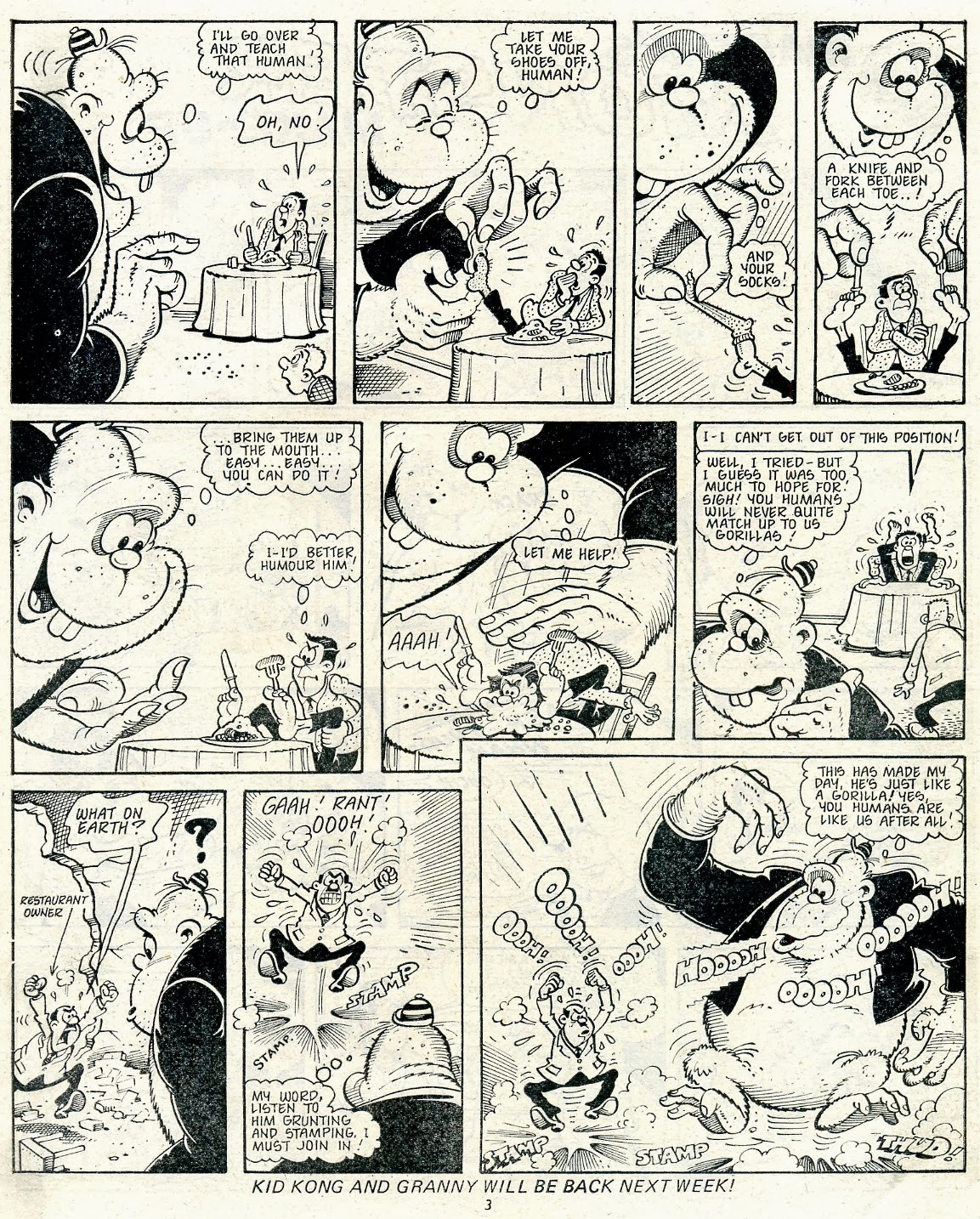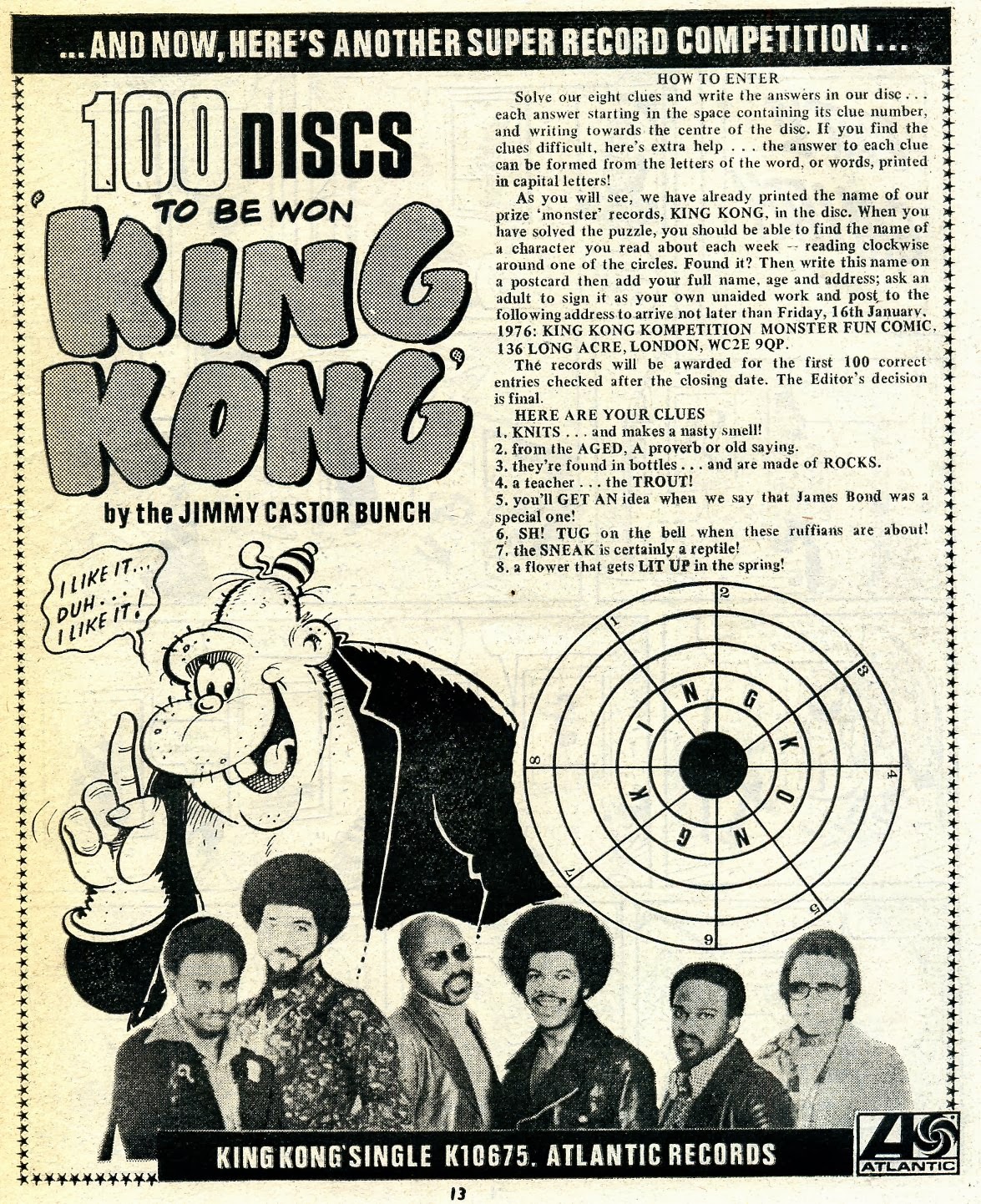As
we know from the introductory three-pager, Kid Kong was ‘the biggest gorilla in
the World and son of the famous King Kong’. He was an exhibit and an attraction
of a travelling fun fair. Tired of being mistreated and called names, Kid Kong
broke free, barged into a department store, donned a special outsize school
uniform (a jacket and a cap but no pants) and went to wander the town. He soon
found himself in the front yard of Granny Smith – an elderly lady who’d lived
alone since her boy went to sea. The old but energetic lady was short sighted and
hard of hearing, so she took the giant ape for an overgrown boy and did not
hesitate to offer him shelter, food and protection. The law and the fun-fair
manager stood no chance against the agile Granny. Here is the first episode in
full. Kid Kong’s banana-addiction was obvious from the very start:
If you sit down to read all Kid Kong strips in one go like I did when preparing to write this post, one of the things you are bound to notice is a certain inconsistency in the way Kid speaks. There are episodes where he barely utters a word and restricts himself to grunting and pantomime; in the majority of the episodes he uses a kind of pidgin-English, uttering short phrases such as ‘Kid hungry’ or ‘me hungry’ rather than ‘I am hungry’; in a few episodes, though, he is fluent and well-expressed. Check out an example that happens to be one of the clever episodes mentioned earlier.
Kid Kong didn’t miss a single issue. He was obviously intended to become THE star of Monster Fun Comic, so initially Kid Kong was the first strip you’d find upon opening the paper. Starting from No. 35 it was moved further inside and was given a more-or-less regular slot on pages 8 and 9. All but 4 episodes were two pages long (the three-pagers were in Nos. 1, 13, 18 and 32). The three-pager in No. 13 is quite peculiar because the first few panels contained a brief summary of the very first episode. My guess is that it may have been drawn for MF Annual 1976 before the plans to publish one were abandoned. Here it is in full:
Being
the big star of the comic, Kid Kong made several front cover
appearances (issues 1, 4, 7, 13, 18, 21 and 29). Here are a couple of examples; you can find more in my yearly overviews of the comic HERE and HERE:
There
were several recurring ‘supporting’ characters in the early episodes; they were
Miss Peabody the snooping neighbour, Mr. Snodgrass the man from the Council,
Spike the trouble-making kid from the neighbourhood whom Granny considered a bad
influence on her ‘boy’, and Doctor Payne who taught Kid Kong to peel his ‘nanas
in order to avoid stomach problems. The primary storyline, however, was
focused on Kid and Granny Smith. Kid Kong was a brute and a glutton who didn’t know
his own strength, so in this regard he was like Frankie Stein.
Differently from Frankie, Kid was fully aware he was unlike people around him.
He was quick to realise when he did wrong and admit his guilt. His dietary
focus was solely on bananas. Unlike Prof. Cube, Granny Smith was a loving
grand-mother who took very good care of her adopted ‘child’ and was very
protective of him – townsfolk soon realised they should think twice before
calling Kid Kong a gorilla or any such name in Granny Smith’s presence. She didn't seem to be bothered with the thoughtless destruction that Kid Kong wrought regularly on
her cottage, and she would always be prepared to go the extra mile to supply
Kid with ‘nanas or keep him happy and satisfied.
In
the early episodes comedy derived from Gran’s short-sightedness, Kid’s size and
strength, his silliness or his attitude to humans. The latter episodes were
quite funny in a clever way and I’ll return to them later on. From the very start,
however, there was hardly an episode where bananas weren’t mentioned in one way
or another.
As
weeks went by, Kid’s appetite for ‘nanas increasingly became the recurrent
theme and the most common source of comedy. Usually, weekly instalments told about
Kid’s and/or Granny’s efforts to get hold of some of the favourite food; a
number of stories didn’t have the quest for bananas as the main line but they
still ended with Kid or Granny receiving a prize or reward in the form of the
fruit. The writers must have realised that overexploiting the banana theme was
a sure way to make the strip boring and repetitive, so it’s good they spiced it
up by giving the theme an occasional weird twist (for example, in issue 23 Kid
Kong visited a psychologist for an intelligence test, and in issue 56 Granny decided
to cure Kid Kong’s banana addiction and made him join Bananas Anonymous), changing
the setting (for example, in issue 63 the two took a trip to London and in
issue 72 they went on an expedition to the Himalayas to visit Kid Kong’s cousin
– Abominable Snowman), or using some fresh ideas from time to time, such as in
this episode from issue 64:
If you sit down to read all Kid Kong strips in one go like I did when preparing to write this post, one of the things you are bound to notice is a certain inconsistency in the way Kid speaks. There are episodes where he barely utters a word and restricts himself to grunting and pantomime; in the majority of the episodes he uses a kind of pidgin-English, uttering short phrases such as ‘Kid hungry’ or ‘me hungry’ rather than ‘I am hungry’; in a few episodes, though, he is fluent and well-expressed. Check out an example that happens to be one of the clever episodes mentioned earlier.
There
was one episode where Kid shared his thoughts on human language:
Kid Kong didn’t miss a single issue. He was obviously intended to become THE star of Monster Fun Comic, so initially Kid Kong was the first strip you’d find upon opening the paper. Starting from No. 35 it was moved further inside and was given a more-or-less regular slot on pages 8 and 9. All but 4 episodes were two pages long (the three-pagers were in Nos. 1, 13, 18 and 32). The three-pager in No. 13 is quite peculiar because the first few panels contained a brief summary of the very first episode. My guess is that it may have been drawn for MF Annual 1976 before the plans to publish one were abandoned. Here it is in full:
As
was often the case in UK children’s comics, characters from other MFC strips
made the odd guest appearance in Kid Kong. In issue 38 Brainy and his
Monster Maker saved Kid from starvation when supplies of bananas were halted
due to a dock strike in Jamaica:
…
and in issue 45 X-Ray Specs helped Kid make amends for the damage he caused at
the garden fete:
Frankie
Stein sneaked in his comment in the last panel of the set in issue 34 (in that
episode Kid Kong repelled an alien attack on Earth):
In
episode 33 Granny wanted to teach Kid not to be greedy and told him to share
his bananas with others. The episode is quite unique because although it wasn’t
unusual for artists to sign their sets or even include their self-portraits, it is the only instance that I can recall when a character
addressed his creator by name:
Robert
Nixon was the regular artist of Kid Kong throughout the run of MFC,
except towards the very end when he was briefly substituted by Les Barton (in
issues 68 and 70) and Jim Watson in No. 69. Both signed their sets. Jim Watson
tried to imitate Mr. Nixon’s style:
…while
Les Barton didn’t bother:
…
OK, maybe just a little bit:
In
his interview for the Winter 1981 edition of Golden
Fun Mr. Nixon said that Kid Kong was one of the characters
he designed. He recalls that Bob Paynter telephoned him with an idea of what he
wanted to see. Mr. Nixon did preliminary drawings and sent them off to him for
approval. The artist recalls doing Kid Kong a bit too big at first and later toning
him down. His vision of Kid and Granny was the one that was always used. When
speaking about his favourite characters, Mr. Nixon said he’d put Kid Kong
virtually on equal par with Frankie Stein which was his all-time favourite (as of the time of the interview in the early eighties).
Kid
Kong got as many as two pull-out posters (in issues 8 and 57 – you can see both
in my yearly reviews of MFC in the earlier posts). He was also selected to
promote a competition in issue 31 (someone boobed there by naming him King Kong rather than Kid Kong...):
Kid
Kong easily survived merger with BUSTER in 1976
and continued there for another five years until 30th January 1982. He was also
a regular character in all Monster Fun Annuals so expect to hear more of him
when I take a look at them in due course.
The
MFC run of Kid Kong had many excellent sets, I have shown quite a few and
mentioned many more in this article. If you’d like to see a particular one out of those
mentioned or perhaps one you remember from the days when you were reading the
comic, let me know and I will put it up in my next post.



























Loads to read...
ReplyDeleteKid Kong like Gums (Jaws) was inspired by a recent movie of the time..
http://www.imdb.com/title/tt0074751/ the king kong remake in the 70's..
Interesting your thoughts on Frankiestein and his Dad and Kid Kong and his Gran relationship..
ReplyDeleteRob Lee drew Kid Kong in a Robert Nixon style in Buster later...Gran got her eyesight back in these strips.. then lost it again..I think it was 1980's Buster..
I've found the page by Rob Lee and done a blog post on it and to advertise your new post on Kid Kong..
ReplyDeleteThanks, Peter. I can't see the Rob Lee page on your blog yet.
DeleteI remember being saddened when Kid Kong was dropped to make room for the Jackpot characters. Perhaps somebody wanted to avoid confusion with Kid KING, or maybe both would have been too much for Mr Nixon. Still, 6½ years of monkey business are better than a used ‘nana skin any day!
ReplyDeleteYou can see it on your blog list now...
ReplyDeleteAlso Rob Lee's version of an origin is interesting to compare..
saw the last Kid Kong which was just a normal story it is the last before Buster merges with Jackpot..